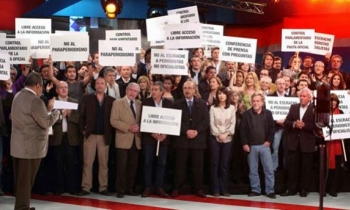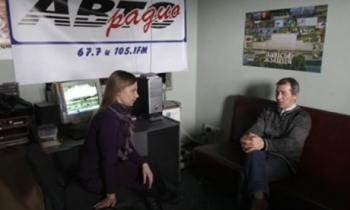Stalin's quip - "How many divisions has the Pope?" - is often taken for a universal truth: for all its power to describe man's nature and destiny, religion lacks the brute force to affect the world of politics and diplomacy. The uproar over caricatures of Mohammed that appeared in a Danish daily shows that the rule does not apply to Islam in quite the same way. This week's death threats, bomb threats and mass demonstrations reveal two big problems. First, an important part of the Muslim world is fighting a war of civilisations, whether the west wants one or not. Second, the west cannot figure out whether it ought to deal first with those Muslims or the peaceable ones.
Fleming Rose, culture editor of Jyllands-Posten, commissioned the 12 cartoons in an effort to clear the air of "self-censorship". A Danish children's writer had announced he could find no artists willing to illustrate his biography of Mohammed. You can see why the artists worried. Islam holds such drawings to be idolatrous. When they were published last September, the cartoons - some mere gags and doodles, others potentially insulting - caused resentment in Denmark and outrage in Pakistan, where the radical party Jamaat-i-Islami put a price on the head of the biographer.
But a week ago, when a Saudi imam broadcast a sermon about the affair, much of the Muslim world flew into an anti-Danish rage. Syria, Kuwait, Saudi Arabia and Libya withdrew their ambassadors. Jyllands-Posten was evacuated twice for bomb threats. The Danish embassy was attacked in Jakarta. In Gaza, Palestinian terrorists threatened visitors from Denmark, France and Norway (where the cartoons had been reprinted) as well as Swedes, for whatever reason. Gunmen took over a European Union office in Gaza and a German man was kidnapped. Boycotts were launched across the Muslim world of Danish companies such as Lego, Bang & Olufsen and Arla Foods - which announced it was losing $2.4m (£1.3m) a day. (The French retailer Carrefour followed suit, posting sycophantic signs in its stores reading: "We express solidarity with the Islamic and Egyptian community" - and then, in red letters: "Carrefour doesn't carry Danish products".)
In Denmark, prime minister Anders Fogh Rasmussen and the editor of Jyllands-Posten apologised for any hurt feelings, while refusing to compromise Denmark's historically absolutist view of free speech. These regrets are warranted. A lot of Muslim anger, here as elsewhere, is an understandable reaction to a culture willing to depict holy things in an ignominious light. And painful though a boycott may be to business interests, people have a right to do business with whom they will.
The problem is that there are not one but two tracks of Muslim protest: a rational one and a radical one. The radicals are unlikely to be swayed by appeals to principle. Saudi Arabia, now campaigning on behalf of Denmark's religious minorities, practises systematic repression against its own, and opposes non-Muslims even setting foot in much of its territory. Syria, the other champion for religious respect, solved its own "problem" with fundamentalist Islam in 1982 by destroying the city of Hama, and thousands of the men, women and children who lived there.
Observers keep reaching for doctrinaire explanations of what the Danish controversy is about. "The issue at stake here is not 'self-censorship'," Edgar Bronfman of the World Jewish Congress wrote in The Times.
"It is whether respect for other religious beliefs, traditions and practices really applies to everybody, including Muslims."
It would be nice if that were true. But there have been enough similar episodes to make clear that self-censorship is at stake here: the fatwa against Salman Rushdie, the murder of Mr Rushdie's Japanese translator and his Norwegian editor, the murder of Theo van Gogh in the Netherlands in 2004, the insistence on anonymity of all translators of the Dutch politician Ayaan Hirsi Ali, and so on. Bill Clinton, the former US president, and German Muslim leaders have also likened the cartoons to historical anti-Semitism. But this is cant. The worst threats and most unruly demonstrations did not object to any demeaning "message" in the cartoons. They objected to the sacrilege of depicting Mohammed at all. This is not a demand for respect or fair treatment. It is a demand that non-Muslims live by Muslim religious rules.
In recent decades, Denmark has been a haven for hardcore pornography, Nazi broadcasting and movies flogging the dead horse of European Christianity. One did not notice global leaders rushing to condemn the Danes. Are the Mohammed drawings so much worse than these? Or is it that they have been met with a credible threat of violence? The question ought to embarrass those western artists and intellectuals who style themselves "subversives". The subversion for which they pat themselves on the back is revealed as mere bullying - choosing targets who reliably turn the other cheek. The same goes for many politicians. Last week, as Palestinians threatened to kill any Norwegian found in Gaza, members of Norway's governing coalition threatened their own consumer boycott - against Israel.
Eighty per cent of Danes oppose an apology over the Mohammed cartoons. A delegation of Danish Muslims who toured the Muslim world last December to drum up outrage over the caricatures is now being accused of disloyalty. That only hints at the tensions. Forty-five per cent of second-generation immigrant youth are unemployed and Denmark now has some of the strictest immigration laws in Europe. The situation is a tinderboxand the country no longer has any safe or simple choices. It owes its Muslim citizens respect and a chance at a better life. But it also has genuinely dangerous enemies who will view any efforts in that direction as a sign of pusillanimity and fear.
The writer is a senior editor at The Weekly Standard









